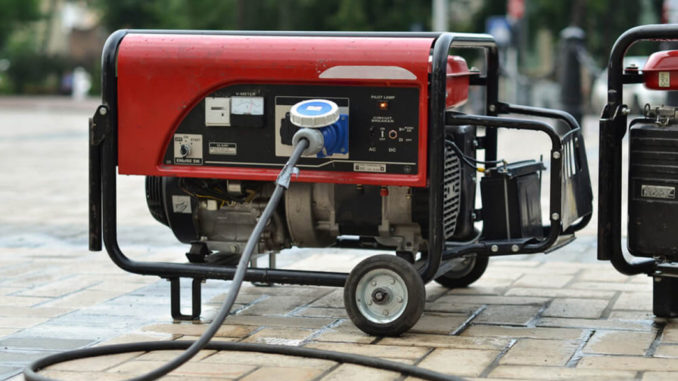
A recent private member bill in the National Assembly seeking to ban the importation and sale of generators in the country is vexatious, insensitive and anti-people and so should be withdrawn immediately.
It beats the imagination that amid the epileptic power supply crisis in the country without any glimmer of hope, a lawmaker is proposing a bill to ban electricity generators, the last resort for homes and businesses. This economy will grind to a halt if generators are banned without first providing power.
The lawmakers are expected to tackle the power supply challenge with laws to improve the ugly situation and not to joke over it with a frivolous bill. What the bill has exposed is a lack of critical thinking on the part of the lawmakers and the fact that Nigerians are not factored into the equation.
Otherwise, the proponent should have first evaluated the impact the bill would have on the people and economy if passed into law. But that was not done. In a way, the sponsor of the obnoxious bill was indifferent to the consequences and provided no alternatives.
So, given the circumstances, Nigerians face, banning generators can never be a solution to the electricity problem.
The bill sponsored by Senator Birma Enagi from Niger State reportedly passed the first reading at the Senate. This is curious.
Coming on the heels of a protracted energy crisis bedeviling the nation to which a solution is needed, Enagi said the essence of the proposed legislation was to curb the menace of environmental pollution and facilitate the development of the power sector.
It specifically states, “Any person who imports generators or knowingly sells generators shall be guilty of an offence and be liable on conviction to be sentenced to imprisonment for a term not less than 10 years.”
The bill, however, excludes importers and sellers of generators meant to power essential services including medical purposes in hospitals and nursing homes and healthcare facilities. Others are airports, railway stations, elevators, escalators, research institutions and other facilities that require 24-hours electricity supply.
It is surprising that senators in 21st century Nigeria do not think that human beings need 24-hour power supply. This is very unfortunate. Senator Enagi should be told that Nigerians need electricity 24 hours daily for healthy and improved livelihood. Nothing else could be more in need of electricity than the human person.
Reacting to the bill, the Director-General of the Nigeria Employers Consultative Association (NECA), Dr. Timothy Olawal, described the move as crude. For him, there was no need for an act to criminalise the importation, sale and use of generators in Nigeria, noting that the move was a knee-jerk response to national development. This is an appropriate reaction and voice from the private sector. And it should not be ignored.
Doubtless, the nation is faced with a serious energy challenge, which predates the privatisation of the power sector. As notable stakeholders have observed, while we agree with the imperative to protect Nigerians from environmental pollution and associated risk, we affirm too that criminalising the importation and usage of generators is a crude and non-ingenious way to deal with a serious national issue. Besides, Nigerians should not be punished for the ineffectiveness and policy inconsistency of successive governments.
This newspaper aligns with a groundswell of opinion that if the bill sails through, it can kill the small and medium-size businesses as almost all of them use generators in the operation of their businesses.
Instead of this wild goose chase, government should focus on putting in place policies that would help in accelerating the growth of the sector to make the importation and use of generators unattractive. As we have repeatedly suggested here, authorities in Abuja should also promote and encourage the use of alternative clean energy sources. A more strategic approach to national development will fast-track the industrialisation and development of our nation. This approach includes putting electricity on a priority list today. And the reasons are not too far to seek. First, unreliable electricity supply constitutes a major constraint to doing good business in Nigeria.
Therefore, a knee-jerk ban on the sale and use of generators without resolving the challenges in the power sector will further compound the challenges faced by businesses. So, what the lawmakers should be concerned about is how to fix the power sector and make laws that would create an enabling environment to make businesses thrive, in this connection. How many megawatts of electricity do Nigeria’s 200 million people need? Only about 3000 megawatts are currently available for distribution even when the generating companies are saying they have the capacity for more. These are the issues that should occupy the lawmakers with the aim of making laws to improve the situation.
This newspaper has been harping on using alternative energy sources including solar power, wind and hydro-power but leaders in this sector appear unmoved. They like rhetoric more than action. The Mambilla hydro-power project has become a scandal for decades. No one has been questioned on the Mambilla scam by the same legislators who like oversight noise! Why can’t the lawmakers enact laws that would make power project abandonment criminal?
In the final analysis, instead of a toxic bill to regulate the importation of generators, the power sector needs deregulation to enable different levels of operators to provide power. Power generation and distribution should be decentralised. The current national grid can’t serve our strategic need anymore. So, while awaiting actionable plans on the power sector reforms, the proposed bill on the importation of generators should be trashed because it is an unnecessary time waster.


Be the first to comment